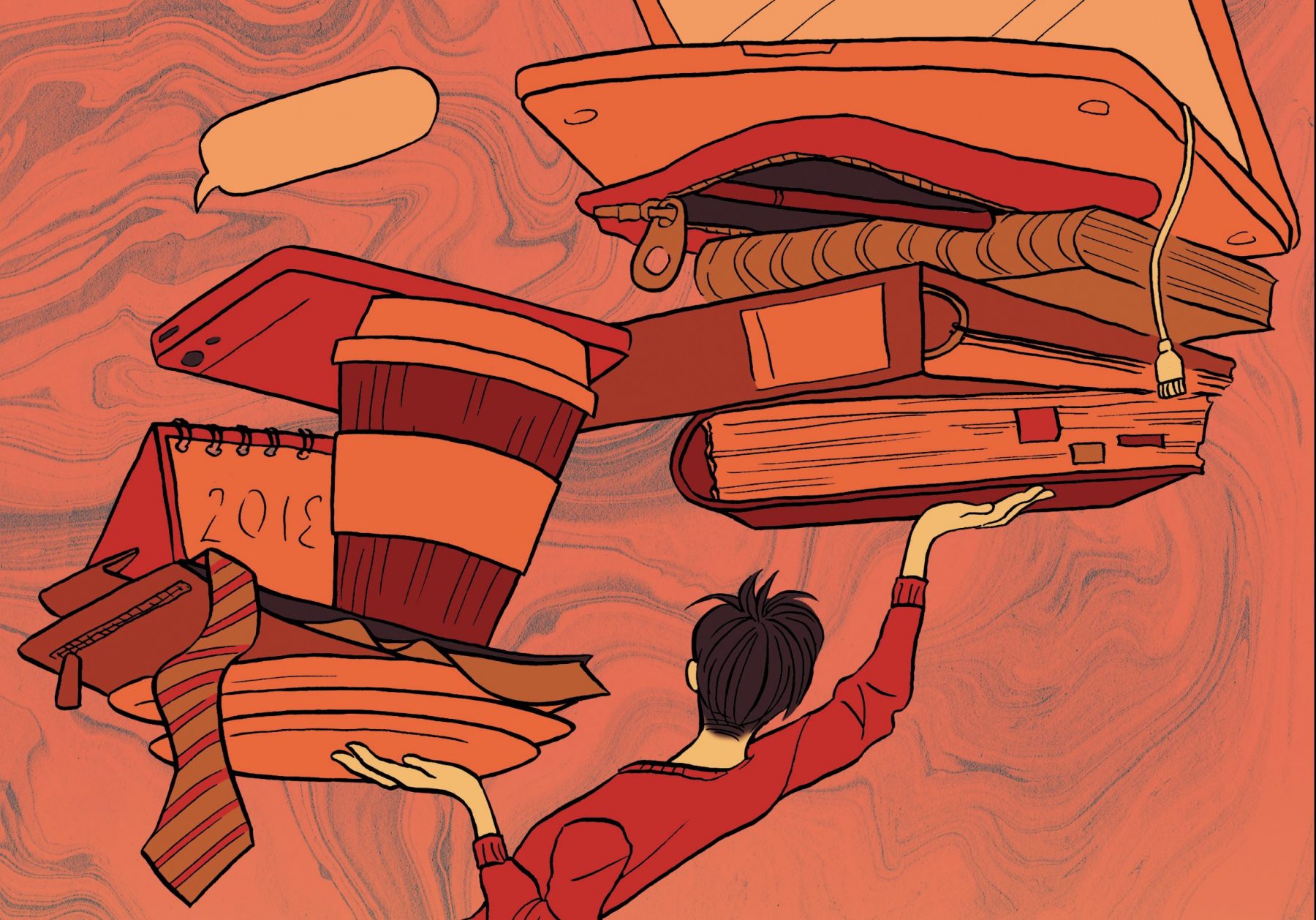Words by Julia Pillai | @juliapillai
Illustration by Sarah Loo
After four years of my undergraduate degree—carefully negotiating bizarre university bureaucracy, figuring out which parties are worth it, and perfecting the careful art of sifting university clubs from cults—I feel like a JAFFY again. JAFFY, meaning ‘just another fucking first year’, is a term that seems to be used to an alarming extent at Monash University and the University of Melbourne.
On a side note, having graduated from the former, I am no longer in a phoney blood feud with the latter. That’s going to be a great change!
Beginning grad school is a strange feeling. At the age of 22, I’m much older than most people starting their undergrad and am seriously verging on university “lifer” status (“Hello fellow kids!” I yell, wearing my music band shirt with a flipped cap, grasping onto my skateboard). In saying this, however, I’ll definitely be one of the youngest in my cohort. When I applied for my course, after many years of trying to forget my ATAR, I had to quote those four infamous digits in my application. After all this time, the mantra of “no one will ever ask for your ATAR ever again” appeared to be a lie!
I’ll need to learn about those secret cheap lunch places and that dodgy café I’ll need to avoid. Which is the universally despised building? Is hating (and loving) a singular building a Monash thing, or all universities? And why is RMIT Stalkerspace still focused on gushing about the cute person you bumped into rather than dank memes or shaming JAFFYs who get caught in revolving doors?
Instead of spending time on a campus that is so big people call it a city (Monash Clayton has its own postcode), I’ll be going to campus actually in the city. Do people lurk around campus after class making friends, or is that just a suburban university thing? And what about RMIT students, do they keep to themselves and slowly disappear into Emporium?
My finely-tuned routine will change. I will no longer need to catch a myriad of trains and strange buses to uni, or take the crowded intercampus shuttle bus for classes on different campuses. After years of straddling between two campuses, everything I’ll need will likely be neatly situated on Bowen Street, or very close to it. Wild.
Is it just me, or is RMIT a somewhat bewildering place for even seasoned students?
I spoke to Isadora Bogle who completed a graduate diploma of journalism at RMIT in 2017. Prior to studying at RMIT she attended UWA and ANU. The main difference, she said, between undergrad to postgrad was that “most of [her] classmates were juggling a number of different jobs and internships, so even though we spent a lot of class time together, we really had to make an effort to hang out and get to know each other.”
“This was also influenced by RMIT’s [small] campus and [CBD] location, which meant people didn’t just hang out on campus,” Bogle said.
So what does RMIT have for postgrad students?
For postgraduate by coursework students, the university runs drop-in learning centres that operate throughout the year. The university also runs postgraduate coursework workshops that cover everything from note taking skills to how-to sessions on writing a thesis.
For PhD and Masters by Research students, the PhD Up! program runs workshops and info sessions throughout the year, and the School of Graduate Research at RMIT also runs academic focused activities. Postgraduate students at RMIT have a specific student lounge, located in Building 13, Level 2, Room 24. Additionally, postgraduate students can access specific study rooms at RMIT Library that they can book for up to four and a half hours for private, uninterrupted and blissful study.
As far as student representation, RMIT Student Union (RUSU) has a postgraduate department, with Mayura Ashok the postgraduate officer for 2018.
“If you have any academic or non-academic issues with RMIT during your time as a postgrad student, you can reach out to our postgrad student rights officer Sarah Joyce ([email protected]) or myself. We’re part of an independent body and happy to help,” Ashok advised.
RUSU is also an affiliate of the Council of Australian Postgraduate Associations (CAPA), a national body which represents postgraduate students and runs campaigns.
The crux of this though, is that once you’ve figured out a space where you fit in—you will leave it. Once again you find yourself in a new world with a different vibe, strange lingo, unfamiliar humour and new experiences. The cycle of confusion and confidence turns again.


